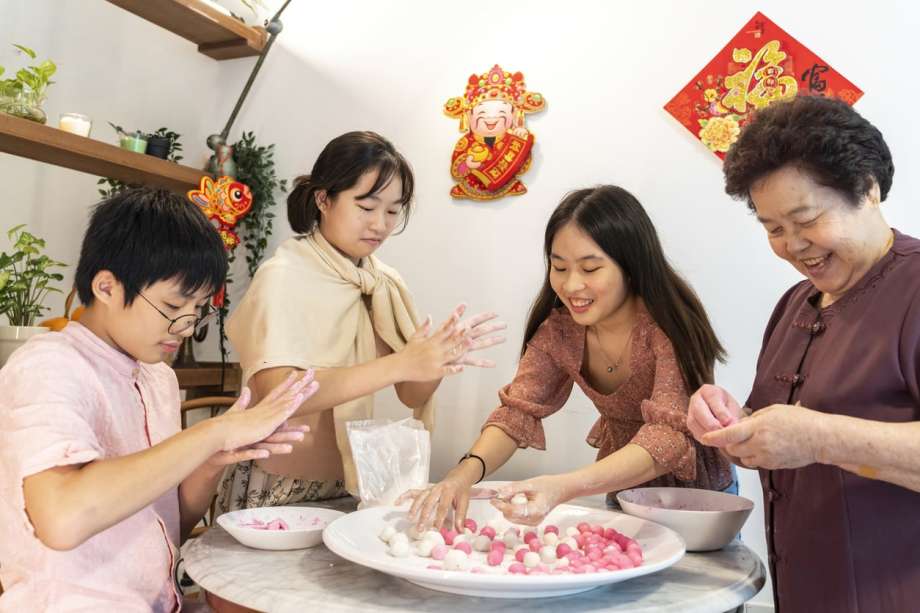10 Ways to Celebrate AAPI Heritage Month with Kids

May is Asian American Pacific Islander Heritage Month. During AAPI Heritage Month, we celebrate the achievements, history, light, and love of AAPI communities.
It’s important to recognize that the AAPI community is not a monolith; it consists of a diverse array of ethnic and cultural backgrounds spanning from Hawaii to the Philippines to China to Japan, Korea, India, and all over the world.
According to the Pew Research Center, it is estimated that there are over 24 million Americans who can trace their roots to countries in East and Southeast Asia and the Indian subcontinent.
Related: How Watching Chinese Youtube Videos Helped Our Family Learn Our Native Language
Honoring AAPI experiences and celebrating AAPI Heritage Month with kids throughout the month of May means recognizing the diversity of these different cultures, histories, and identities.
Every family is different and finding what works for you is what will create a lasting impact for generations to come. Here are some ways to teach your kids about their Asian culture and to celebrate AAPI Heritage Month with the whole family.
What Does Dignity Mean?
Dignity is one of the most important things to the human spirit. It means being valued and respected for what you are, what you believe in, and how you live your live. Read More
10 Ways Teach Kids To Be Proud of Their AAPI Culture
1. Share What You Love About Your Culture
Leading by example can be a very effective way to teach kids anything because they learn by copying you. Start talking to them about what you love about your AAPI culture including memories, stories, and how it shaped you as a person.
Maybe it was the times you spent with your grandparents or the trip you took with your family to visit your native country. When kids see you speaking proudly about your culture, it’s natural for them to feel it too.
2. Talk To Your Family Members
Talking to grandparents, relatives, and elders is a wonderful way to get to know your family history and where you came from. Make plans to visit them. You can schedule a video call if they don’t live locally.
Be sure to have a translator app or Google Translate open in case there are any language barriers. Ask them to share stories about their upbringing, where they grew up, what they did for work, ancestors, favorite traditions, meals, hobbies, and interests.
Try out this fun Family Tree Activity to really explore your cultural roots!
3. Learn Another Language
Language is a huge part of many AAPI cultures. If you’re not fluent, this is a great opportunity to learn a few common phrases or words in your native tongue with your kids.
Related: The Night My Daughter and I Shared Our First Chinglish (Chinese-English) Joke
Here are some simple and easy-to-use apps and websites that offer multiple AAPI languages to help make learning a language interactive and fun for your kids: 11 Best Language Learning Apps for Kids.
4. Teach Them About The Significance of Family Names
In many AAPI cultures, family names are very important. Teaching your kids the history behind their last name can be an empowering and meaningful lesson. Their name represents a direct connection to their heritage and ancestry and how they came to where they are.
Find out more by exploring Surname Meanings and Culture Origins!
5. Learn and Adopt Special Celebrations, Holidays and Traditions

There are different holidays and traditions that are celebrated by the AAPI community. Teach your kids about these celebrations and their significance. Mark these special dates such as those that follow the lunar cycles on your family calendar and discuss ways to honor the traditions.
For some ideas, see our Guide to Lunar New Year Celebration Ideas for Kids (& Recipes!)
6. Teach them About Honorific Titles
Some cultures such as Chinese, Korean, and Japanese use honorific titles during social interactions. This depends on the level of intimacy between the two people which includes the age, gender, and marital status of the individuals involved. Teach your kids how to address someone in their culture.
For example, 贤郎 (xiánláng) is a Chinese honorific title meaning “the virtuous young man” and is often used to refer to a close friend’s son.
In Japan, 坊【ぼう】( Bō) is an expression of endearment or closeness.
7. Host an AAPI Movie Night!
Your kids can learn a lot about their culture through movies, documentaries, and shows. Certain scenes can help bring up conversations that you may not have thought of such as racism, identity, stereotypes, immigration, discrimination, and microaggressions.
One great AAPI documentary recommendation is PBS’ 5-hour Asian Americans series that was released in May 2020. The documentary is currently available to watch for free on the PBS site.
Choosing movies with good Asian representation and strong Asian characters is also a great way to help younger kids see reflections of their own experiences. Some popular AAPI movies for kids include “Over the Moon,” Disney’s “Moana” and “Raya the Last Dragon.” Another good movie pick is 2021’s “Finding 'Ohana” — featurinfOscar-winner Ke Huy Quan!
8. Visit AAPI Museums and Historic Sites
Visiting museums and historic sites that feature AAPI history and achievements can give your kids an interactive experience to learn about their heritage. The Asian Art Museum at the Smithsonian in Washington D.C. showcases a vast collection of cultural artifacts and Asian art throughout generations.
If a field trip isn’t feasible, find out if the museum offers virtual tours.
9. Use Food To Celebrate Your Culture
Many AAPI cultures consider food as the glue that connects family, friends, places, and experiences together. Here are some creative and fun ways to help your kids connect their heritage with the food they eat.
Shop At An Asian Supermarket
What better way to learn about their heritage than to shop at an Asian supermarket? It’s an experience that gives your child exposure to different cuisines. Asian supermarkets are cultural hubs that offer a wide variety of products and international foods to explore.
Have your kids search online for an authentic recipe and let them help you shop for ingredients.
Cook Together
Incorporating traditional foods into the weekly meal schedule helps expand your child’s palate.
Whether it’s putting together a cold noodle salad, soaking dried fungus or preparing a gallon of kimchi, involve your kids in the cooking process so they appreciate who they are and how food connects them to their ancestors.
Eat At AAPI Restaurants
Dining out isn’t just a great way to support your local AAPI businesses, it can be an opportunity to teach your kids about their culture through food. Visit your closest neighborhood Chinatown, Koreatown, or other cultural districts to discover some delicious authentic dishes you won’t find anywhere else!
10. Plan A Vacation To Your Heritage Country
Lastly, if it is feasible, a trip to your heritage country can give your kids an authentic first-hand experience of their culture. They aren’t just passively reading, watching and listening about their heritage; they have an active opportunity to smell, taste, hear and feel it.
Celebrating AAPI heritage doesn’t only have to be a month-long event. Helping your kids to build a strong sense of identity with their heritage and feel proud of where they come from can be an everyday effort that will have a positive impact for the rest of their lives.
Why Celebrate AAPI Heritage Month and Honor AAPI Culture
AAPI Heritage Month is an important time to recognize, reflect on, and celebrate the contributions of Asian Americans and Pacific Islanders (AAPIs) throughout our history.
From exploring your family tree to making traditional Asian dishes, celebrating AAPI Heritage Month gives kids the opportunity to learn more about their identities and experiences and promote a more equal and diverse society.
To Acknowledge the Different Forms of the “American Experience”
Many Asian Americans grew up struggling to balance two identities — their family’s country of origin and Western culture American culture. As written by Shinwha Whang in The Greater Good Science Center at the University of California, Berkeley, titled How Identity Shapes the Well-Being of Asian American Youth:
“There was a significant Asian American community where I grew up, and among my friends, I saw many ways in which families negotiated these two cultures. Some families spoke their first language at home, some didn’t. Some ate their heritage foods for all their meals, some only for special occasions. Some made annual trips to their country of origin, while others never or seldom visited. Mixed into these everyday practices, parents modeled attitudes about race, racism, and the majority culture, verbally and nonverbally.”
Straddling this dual identity crisis can create challenges that impact the health and well-being of Asian Americans.
A 2021 study published in the Journal of Youth and Adolescence used a person-centered approach to look at the association between ethnic-racial identity and the well-being of Asian American adolescents.
Researchers collected data on ethnic and racial knowledge, sleep quality, academic performance such as grades and school engagement, delinquency, and psychological well-being such as self-esteem and symptoms of depression. The results showed that those who had a stronger ethnic-racial identity had better academic and psychosocial outcomes.
Celebrate Diversity and the Contributions of Different Cultures
Celebrating AAPI heritage month can be a wonderful opportunity to talk to your children about their culture, roots, and where they came from. The best way to teach your kids to be proud of their culture is to make it meaningful for your family. Some might value food and traditions and others might want to pass down their native language.
Perhaps you want to visit your local Chinatown or Korean neighborhoods to take part in cultural festivals. If you have younger kids, they may be interested in learning about the stories of Asian American immigrants throughout American history.

Stand Up Against Anti-Asian Hate and Stereotypes
In the past few years, Anti-Asian hate crimes and Anti-Asian sentiments have been on the rise in America. For Asian American parents, it can be difficult to explain this hate to their children. But this discrimination and racism aren’t new.
Some of the greatest accomplishments in early American history such as the completion of the Transcontinental Railroad in the 19th century were only made possible by exploiting the labor of Chinese immigrants.
Similarly, discriminatory laws against Japanese Americans enacted during World War II led to prejudice and mistreatment of Asian Americans that have impacted families for multiple generations.
That's why Asian American Pacific Islander (AAPI) Heritage Month is so important. It is an opportunity for families to come together and celebrate AAPI culture as well hold space for conversations about history and current events.
Kids from Asian-American families should find strength and pride in their culture and use that strength to fight against Anti-Asian discrimination.


